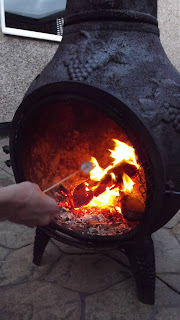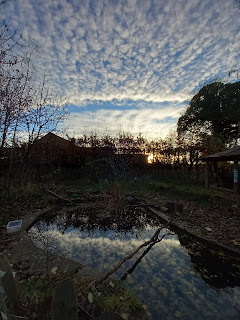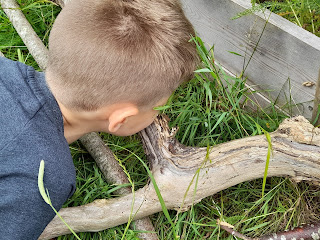No Fire without Smoke
Last week I pondered how bad campfires actually are for our health.
The effect on both the Forest School Leaders spending a lot of time alongside them breathing in heated air, smoke, particles, and any number of possible unknown toxins, and on the developing lungs of children in our care.
There are ways to mitigate risks, and a good risk/benefit analysis should make how we practice as safe as we can. There is no way to totally eliminate the pollution of our bodies without saying no to fires completely. The decision has to be up to the individual - but I do think we are heading towards participation being something we need informed parental agreement for.
We also need to consider the effect on both our immediate environment and how it affects our carbon footprint.
I have a love of woodland... and hills... and mountains... and the coast... and nature... being outside in general! It's one of the reasons I do my job. At home, I try to be as environmentally friendly as I can, in what I buy, what I use, and what I do.
At work, much of that is out of my control, but in the decisions I make for my small part of the organisation, I try hard to be as eco friendly as I can.
However every time I light a campfire I'm aware I'm making a compromise.
I think we all enjoy a huddle around a campfire but we have to accept that even though it may be a tiny amount, it IS releasing pollutants and contributing in a minute way to global warming. Burning wood releases the particles that are bad for our own lungs as well as carbon monoxide, carbon dioxide, nitrogen oxides and a range of potentially toxic compounds dependent on the wood and its source, none of which equates to good air quality.Carbon dioxide is a potent greenhouse gas that we know contributes to climate change. I appreciate that my small campfire that is alight for 30 minutes is making a negligible contribution! But I had 15 of them last week, that was seven and a half hours worth of burning, and I do this six times a year... That's 45 hours of burning. Imagine a campfire constantly releasing smoke for almost two days and that looks a little more significant than the short burn I see each session.
It is still a drop in the ocean when it comes to polluting the atmosphere.
So is using a single plastic water bottle, the ones I try to avoid buying, the ones I dispose of carefully when I have no choice but to purchase. My avoidance of excess packaging, my trips to the local recycling centre, my aim to shop 'vintage', to reuse, repurpose, and recycle, are not going to shrink the floating island of rubbish in the Pacific Ocean, but I do it as much as I possibly can not to contribute to it.
I do it because it's a small and easy thing to do, if everyone did this one little thing it would be a big thing, and I cannot expect of others what I'm not willing to do myself.
So why do I cling on to having campfires!!??
Well partly because I really enjoy them.
I like to use them to teach fire safety.
I like the children to take part in something that many have not experienced before.
The children love it.
They like to watch the flames.
They like to toast and make food.
They like the camaraderie...
I love the smell of smoke and despite asthma, it doesn't seem to have an effect on me, but the research shows it isn't good for me - or you.
There are very few studies on the effect of smoke on wildlife. If your campfire is beneath a tree you may notice bugs falling from above as they get 'smoked out', although this is usually temporary, they do scurry off, it's proof the fumes have an effect!
In theory squirrels and other creatures nearby can vacate for the duration, although this becomes an issue if there are nests around. The adults may leave and never return. The young birds and squirrels can't leave and can't survive without parents, and such tiny lungs may well be affected.
Smoke inhalation can lead to carbon monoxide poisoning in all creatures, not just humans! It can cause respiratory distress, neurological impairment, respiratory and cardiovascular disease, oxidative stress, and immunosuppression in wildlife! Most of the studies that detected this were on surviving animals after a wildfire, the smoke was denser and lasted much longer. But with such side effects it does require a little thought. The smell of smoke can be taken by some wildlife as a cue to conserve energy or engage in fire avoidance behaviours, which means we are having a negative effect on the animals around us whether we like it or not.
We all know more than the basics about campfires, and we all know our sites pretty well, but sometimes it's good to take a look again with a critical eye.
Check the distance of your fire pit from trees and shrubs, not just how much clearance is all around, but what is overhead. Is the tree canopy likely to trap smoke or ash?
If you have heated air rising the trees WILL become heated too. On buds and new leaves this may cause damage.
If you are having a fire on cleared ground rather than in a fire basket be aware of how deep the heat goes. If your flames reach half a metre high then assume the heat reached half a metre deep - this may affect roots.
Wood ash CAN assist growth. Cold ashes dug into soil can improve it, adding potassium, calcium, phosphorous etc. A thin layer on leaves will usually do no direct harm but thicker layers may interfere with photosynthesis.
Again, my brief campfires, albeit four-a-day, are unlikely to cause much damage. But compared to NOT having them there IS a negative effect on the environment around me.
Collectively, if every Forest School Leader just matches me and is releasing 45 hours of smoke into the atmosphere every year, how much is 'Forest School' as an entity contributing to the problem in the UK alone?
When, as a school, we made the decision that no class would miss out on Forest School, the length of our sessions maxed out at 90 minutes outside. At that time it meant 16 sessions a week.
I stopped doing continual campfires during winter. Frequently children would sit by it 'to keep warm' which was actually counterproductive. Movement is the most effective way to keep warm, sitting at basecamp even with a fire wasn't doing much!
During lockdowns, I wouldn't have a fire as houses back onto our site and we didn't know if anyone was ill in their home. Also, even though it has never happened yet, I didn't want to do ANYTHING that could possibly cause us to require either an ambulance or the fire brigade!
I began ending each of the six terms with a campfire week - a celebration of Forest School. The children asked (and still ask) for marshmallows to toast. The classes filed out to meet me while I kept the fire going all day, and I still ran a campfire week for groups to share a story around the fire.
This began to change to the final sessions in week 6/7 beginning with a fire, the toasting and treats to start the session, and then putting the fire out while we all explore.
This limited the time it was alight.
Now I constantly think about how we move forward, and it's tough.
I think the option of mask-wearing is on the horizon, parental permission to be around smoke will be preferable, and sourcing of wood, plus the length and timings of campfires will all need to be monitored and reviewed regularly.
I really don't want to stop doing campfires, but I am acutely aware that although the risk/benefit to the children involved may be justifiable, I'm not entirely sure the risk/benefit to the environment as a whole can be.
I may have to choose sides.
Do I want to be a part, no matter how small, of the problem?
Or a part, equally as small, of the solution?


.jpg)



.jpg)




Comments
Post a Comment